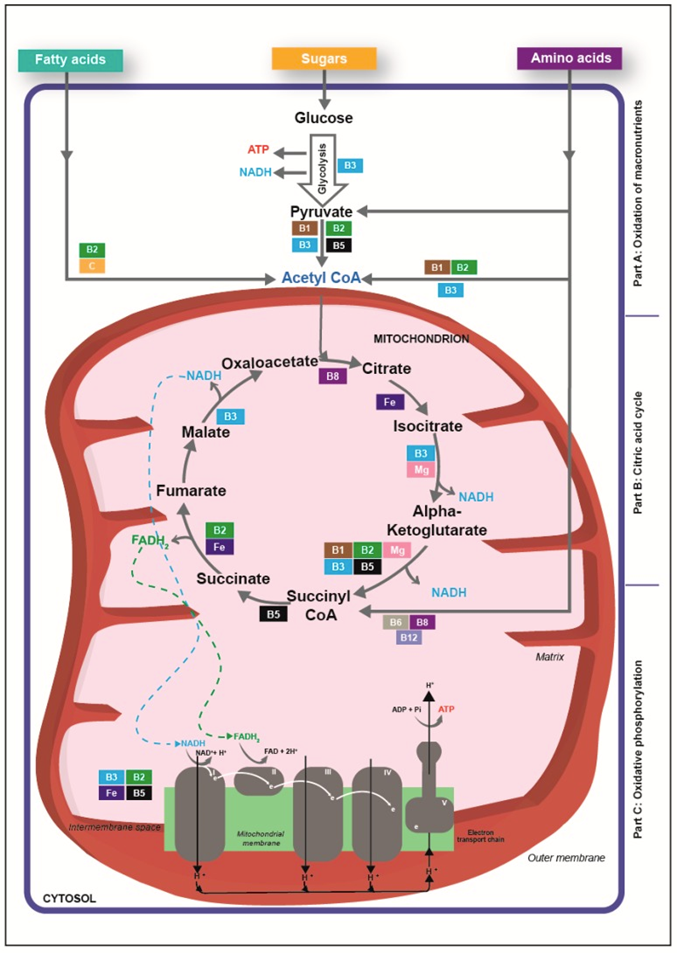Micronutrients are required in fairly small amounts, but they have a monumental role in the brain and body, including energy generation. Vitamins B1, B2, B3, B5, B6, B9, B12, biotin, vitamin C, iron, magnesium, and zinc are especially important for turning food into energy (ATP).
Background
Suboptimal intake and availability of these micronutrients can lead to fatigue and compromised cognitive function, as both brain and muscles depend heavily on them for energy generation.
The adult human brain consumes a significant amount of energy and depends on a constant supply as it cannot store energy the way that muscles do. Under normal circumstances, glucose is the major energy source for the brain. However, it can use alternatives, including lactate, medium-chain triglycerides, and ketone bodies, when glucose is in short supply. The brain also consumes a significant amount of oxygen…compromised availability will compromise cerebral function.
A cell can typically retain a billion molecules of ATP, a level that can be used and replaced every 1-2 minutes. Insufficiency of energy, oxygen, macronutrients, or the micronutrients that facilitate their metabolism can sabotage mental and physical function. For this reason, the evaluation of nutritional status should be an integral part of any health assessment.
 Overview of the involvement of vitamins and minerals in the major pathways of cellular energy production. This figure displays a simplified scheme of energy metabolism. Briefly, macronutrients are oxidized (part A) into acetyl-CoA through several pathways including glycolysis, which produces pyruvate from glucose, and vitamins B1, B2, B3, B5 and C play important roles Then acetyl-CoA enters the citric acid cycle (part B), which generates energy as NADH and FADH2 through a series of eight oxidations that involve vitamins B1, B2, B3, B5, B6, B8 and B12 as well as iron and magnesium. Finally, the electrons of NADH and FADH2 are transferred to the electron transport chain (part C), where they provide energy used to generate ATP molecules; this step needs the input of vitamins B2, B3, B5 and of iron.
Overview of the involvement of vitamins and minerals in the major pathways of cellular energy production. This figure displays a simplified scheme of energy metabolism. Briefly, macronutrients are oxidized (part A) into acetyl-CoA through several pathways including glycolysis, which produces pyruvate from glucose, and vitamins B1, B2, B3, B5 and C play important roles Then acetyl-CoA enters the citric acid cycle (part B), which generates energy as NADH and FADH2 through a series of eight oxidations that involve vitamins B1, B2, B3, B5, B6, B8 and B12 as well as iron and magnesium. Finally, the electrons of NADH and FADH2 are transferred to the electron transport chain (part C), where they provide energy used to generate ATP molecules; this step needs the input of vitamins B2, B3, B5 and of iron.
Source: Tardy, Anne-Laure et al. “Vitamins and Minerals for Energy, Fatigue and Cognition: A Narrative Review of the Biochemical and Clinical Evidence.” Nutrients vol. 12,1 228. 16 Jan. 2020, doi:10.3390/nu12010228. This article is an open access article distributed under the terms and conditions of the Creative Commons Attribution (CC BY) license (http://creativecommons.org/licenses/by/4.0/).
Micronutrients are intimately involved in energy generation, oxygen delivery, and brain health.
It is widely accepted that overt nutrient deficiencies manifest as compromised function or progressive pathology.
Fortunately, it has become more widely accepted that marginal deficiencies or insufficiencies can lead to functional deficits and pathology.
Understanding the role of vitamins and minerals in brain health and energy generation is an integral part of functional nutrition and naturopathic assessment.
Thiamin (B1)
- Helps convert pyruvate and branched-chain amino acids to form acetyl-Co-A
- Helps convert alpha-ketoglutarate to form succinyl-CoA.
- Is required for the production of fatty acids, aromatic amino acids, nucleic acids, and steroids. These compounds then become neurotransmitters, including GABA, acetylcholine, and glutamate.
- Supports the development and structure of nervous system neuroglia cells.
- Thiamin deficiency can lead to beriberi, a disease characterized by fatigue, dyspnea, ataxia, and muscle weakness, tenderness, and pain. Severe deficiency can lead to irreversible brain damage if not addressed early enough.\
Riboflavin (B2)
- Riboflavin coenzymes metabolize carbohydrates, proteins, and fats; participate in the electron transport chain; and participate in the regeneration of glutathione.
- Riboflavin deficiency often accompanies other nutrient deficiencies and can lead to anemia and its associated fatigue.
Niacin (B3)
- Niacin compounds NAD and NADH facilitate glycolysis and the metabolism of citric acid cycle substrates.
- NADH is an electron donor in the electron transport chain.
- Is involved in intracellular calcium balance and signaling which affects cell energy status.
- Niacin insufficiency can lead to fatigue, apathy, weakness, loss of appetite, depression, and memory loss.
Pantothenic acid (B5)
- Is a precursor to Coenzyme A, and citric acid cycle substrates acetyl-Co-A and succinyl-CoA.
- It is required for the production of acetylcholine.
- Supports acetylation of soluble proteins in the brain and body.
- Is instrumental in neurotransmitter release and information transduction.
- Pantothenic acid deficiency is associated with fatigue, insomnia, and personality changes.
Pyridoxine (B6)
- Is involved in amino acid metabolism, one-carbon reactions, gluconeogenesis, glycogenolysis, heme synthesis, niacin production from tryptophan, lipid metabolism, and hormone action.
- Is involved in the conversion of tryptophan to serotonin, and phenylalanine to dopamine.
- Insufficiency of B6 can lead to low red blood cell hemoglobin, microcytic anemia, irritability, and depression.
Biotin (B8)
- Is involved in fatty acid synthesis, branched-chain amino acid catabolism, and gluconeogenesis.
- Facilitates availability of fatty acids for mitochondrial oxidation and amino acids for use in the citric acid cycle.
- Insufficiency is associated with lethargy, depression, hallucinations, and peripheral paresthesia.
Folate (B9)
- Is involved in the metabolism of amino acids, synthesis of DNA, and the production of red blood cells.
- Works closely with vitamin B12.
- Facilitates cerebral methylation and supports the metabolism of serotonin and dopamine, which are essential to mood balance.
- Supports the metabolism of epinephrine and norepinephrine.
- Supports the maintenance of nervous system neural and glial cells.
- Folate insufficiency leads to megaloblastic anemia, fatigue, weakness, shortness of breath, headache, palpitations, anxiety, and depression.
Cobalamin (B12)
- Is involved in the conversion of methylmalonyl-CoA to succinyl-Co-A for use in the citric acid cycle.
- It is essential to folate metabolism.
- Insufficiency is associated with megaloblastic anemia, pernicious anemia, neurological dysfunction, neuropsychiatric abnormalities, mental and cognitive impairment, irritability, depression, and memory loss.
Vitamin C
- Is involved in the production of carnitine, which is required for the transport of long-chain fatty acids into the mitochondria, where they can be converted into energy.
- Insufficiency of carnitine contributes to weakness and muscle aches.
- The antioxidant properties of vitamin C can help protect the brain from oxidative stress.
- Vitamin C regulates and supports neurotransmitter, myelin, and glial cell structure and function.
- It is a cofactor for the production of catecholamines epinephrine, norepinephrine, and dopamine.
- Vitamin C insufficiency is associated with fatigue, muscle pain, irritability, depression, anxiety, and mood changes.
Iron
- Is an integral part of heme enzymes that participate in the electron transport chain and energy production.
- Binds oxygen within the hemoglobin molecule and facilitates oxygen delivery throughout the body.
- Binds oxygen within the myoglobin molecule to help meet muscle oxygen demands.
- Is required for nerve cell proliferation.
- Insufficiency is associated with fatigue, weakness, and intolerance to exercise and work.
Magnesium
- Binds to ATP to create its biologically functional form Mg-ATP within the cell.
- Regulates the activity of several citric acid cycle enzymes.
- Is important in neuromuscular coordination and nerve transmission.
- Magnesium insufficiency can lead to inflammation, oxidative stress, fatigue, lethargy, loss of appetite, vertigo, muscle cramps, and impaired physical functioning.
Zinc
- Has antioxidant and anti-inflammatory properties.
- Supports neuronal development and function.
- Helps modulate neurotransmission and high concentrations are found in specialized “zinc-containing” neurons.
- Insufficiency may be associated with depression.
Ultimately, micronutrient status profoundly affects health status, brain function, energy levels, and quality of life. It must be assessed in order to effectively identify and address the root causes of chronic disease and dysfunction.
Reference
Tardy, Anne-Laure et al. “Vitamins and Minerals for Energy, Fatigue and Cognition: A Narrative Review of the Biochemical and Clinical Evidence.” Nutrients vol. 12,1 228. 16 Jan. 2020, doi:10.3390/nu12010228. This article is an open access article distributed under the terms and conditions of the Creative Commons Attribution (CC BY) license (http://creativecommons.org/licenses/by/4.0/).







